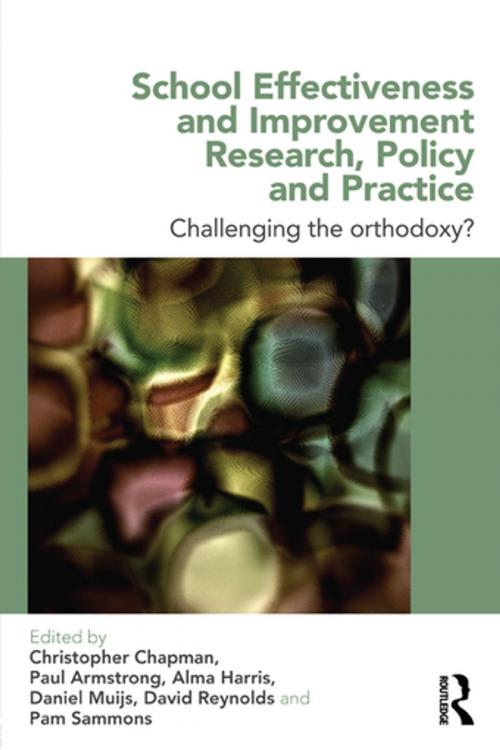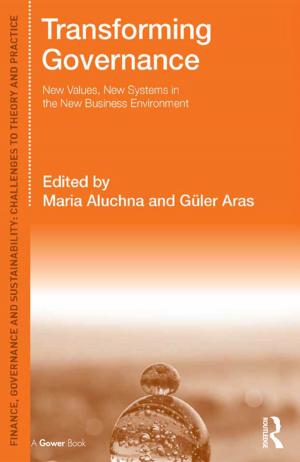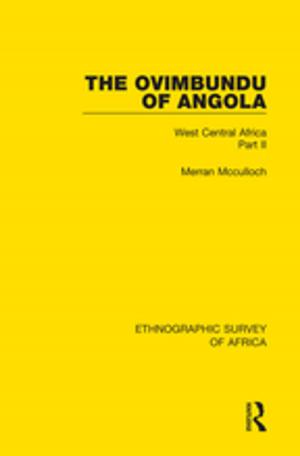School Effectiveness and Improvement Research, Policy and Practice
Challenging the Orthodoxy?
Nonfiction, Reference & Language, Education & Teaching, Educational Theory, Leadership, Educational Reform| Author: | ISBN: | 9781136487460 | |
| Publisher: | Taylor and Francis | Publication: | March 12, 2012 |
| Imprint: | Routledge | Language: | English |
| Author: | |
| ISBN: | 9781136487460 |
| Publisher: | Taylor and Francis |
| Publication: | March 12, 2012 |
| Imprint: | Routledge |
| Language: | English |
This book provides a contemporary overview of school effectiveness and improvement. It charts the development theory and research in this area and looks at the contribution made to policy and practice. It also challenges some assumptions that have become ingrained into the theoretical and methodological traditions of the field. By challenging these orthodoxies, it provides a framework that sets a new agenda and repositions the field to meet the emerging challenges of the twenty-first century.
It argues that traditional measures of school effectiveness are challenged as systems have attempted to adapt to a complex range of emerging agendas. New theoretical perspectives are required which consider 'education' and a 'broader set of outcomes'. This shift requires a rethink of how effectiveness and improvement have been understood by the field, and a reconstruction by policy makers and practitioners. Attention must be given to promoting equity as well as effectiveness so that one school or student's gain no longer means another's loss. The field must develop new methodologies if inequities are to be challenged and a broader set of outcome measures are to be developed. The two questions guiding this book are:
-
How can educational effectiveness and improvement research and practice support the development of a more equitable education service?
What are the key indicators of educational effectiveness and improvement and what are the new methodologies required to facilitate a shift from 'school' effectiveness and improvement to 'educational' effectiveness and improvement?
This book uses lenses of research, policy and practice to explore these key questions and articulate what such a repositioning may look like and how it may be achieved. It will prove invaluable for teachers, school leaders and anyone involved in policy and educational research.
This book provides a contemporary overview of school effectiveness and improvement. It charts the development theory and research in this area and looks at the contribution made to policy and practice. It also challenges some assumptions that have become ingrained into the theoretical and methodological traditions of the field. By challenging these orthodoxies, it provides a framework that sets a new agenda and repositions the field to meet the emerging challenges of the twenty-first century.
It argues that traditional measures of school effectiveness are challenged as systems have attempted to adapt to a complex range of emerging agendas. New theoretical perspectives are required which consider 'education' and a 'broader set of outcomes'. This shift requires a rethink of how effectiveness and improvement have been understood by the field, and a reconstruction by policy makers and practitioners. Attention must be given to promoting equity as well as effectiveness so that one school or student's gain no longer means another's loss. The field must develop new methodologies if inequities are to be challenged and a broader set of outcome measures are to be developed. The two questions guiding this book are:
-
How can educational effectiveness and improvement research and practice support the development of a more equitable education service?
What are the key indicators of educational effectiveness and improvement and what are the new methodologies required to facilitate a shift from 'school' effectiveness and improvement to 'educational' effectiveness and improvement?
This book uses lenses of research, policy and practice to explore these key questions and articulate what such a repositioning may look like and how it may be achieved. It will prove invaluable for teachers, school leaders and anyone involved in policy and educational research.















